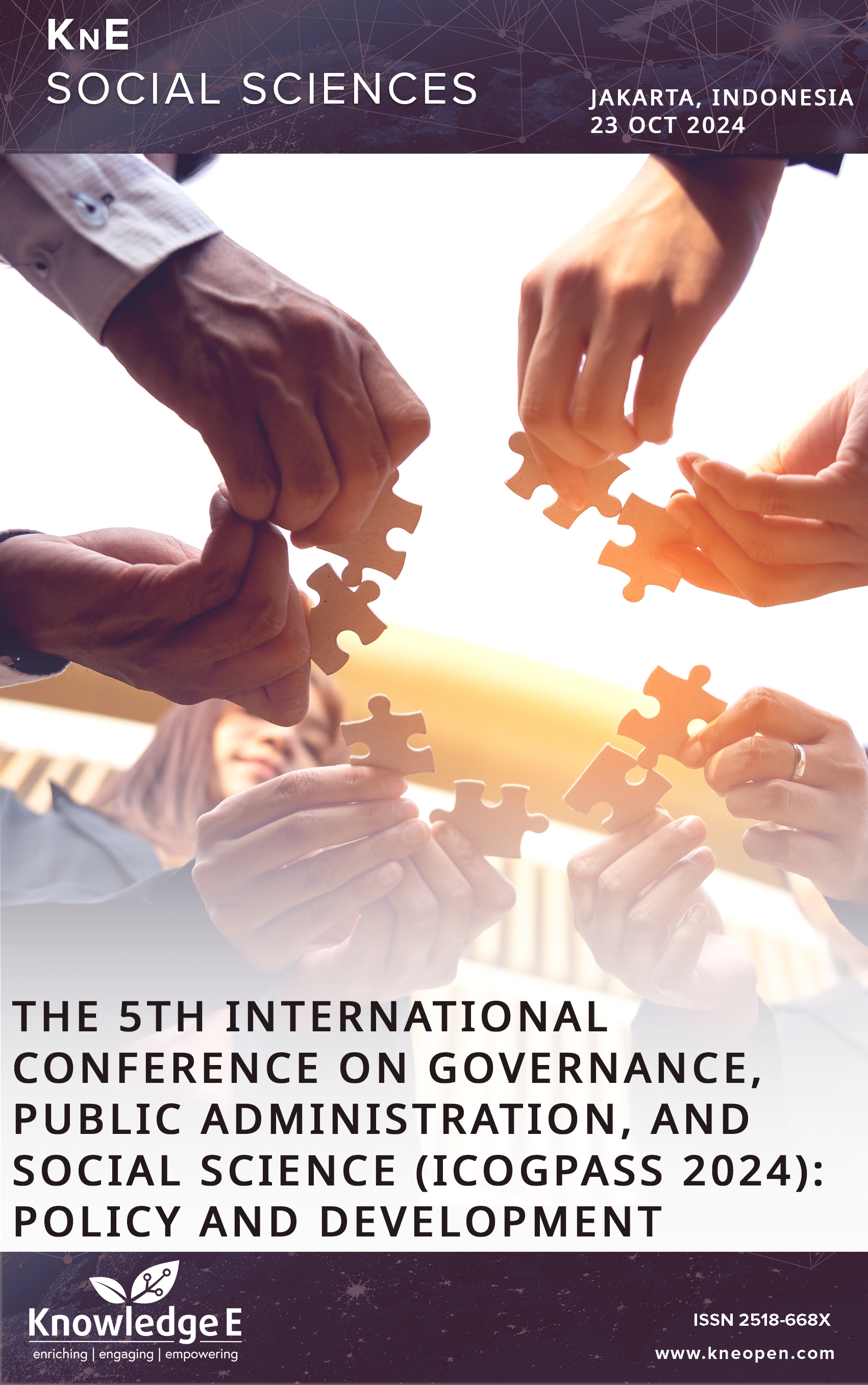Community Empowerment from the Perspective of Collaborative Governance in Bojongcae Village and East Kaduagung Village, Lebak Regency
DOI:
https://doi.org/10.18502/kss.v10i15.19184Keywords:
collaborative governance, community empowerment, villageAbstract
Village independence status and the achievement of SDGs are related to community empowerment in Bojongcae Village and East Kaduagung Village, Lebak Regency. These villages have different statuses of village independence. Bojongcae Village is classified as an underdeveloped village, while East Kaduagung Village is categorized as developed village. Collaborative governance is crucial for building community development through empowerment. With collaborative governance, the government can work together with the community to address and provide solutions through various actors from both government and non-government sectors, ensuring that the benefits of such commitments are experienced by all parties involved. This study aims to analyze community empowerment in Bojongcae Village and East Kaduagung Village based on the five collaborative indicators of Ansell & Gash. The research method used is descriptive qualitative with a case study approach. The results indicate that community empowerment in Bojongcae Village and East Kaduagung Village is carried out solely with the involvement of the government and the community. Furthermore, based on the collaborative indicators of Ansell & Gash, it is apparent that all indicators are not yet optimal for achieving collaborative governance in these villages due to the lack of specific empowerment programs from the village government for the community caused by budget constraints, gaps in understanding, and limited collaboration only between the government and the community. Therefore, there is a need for the expansion of collaboration in community empowerment efforts.
References
[1] Kemendesa. Rekomendasi IDM Provinsi Banten 2023. 2023. p. https://idm.kemendesa.go.id/
[2] Kemendesa. sid.kemendesa.go.id/sdgs. 2024. SDGs Desa Kemendesa.
[3] Ansell C, Gash A. Collaborative governance in theory and practice. J Public Adm Res Theory. 2008;18(4):543–71.
[4] BPS. Data Sosial Ekonomi. BPS. 2024;14(2):127.
[5] Fajri H, Maani KD, Wahyuni N, Malau H. Collaborative Governance Sebagai Solusi Dalam Tata Kelola Pemberdayaan Nelayan. Sosio Inf. 2021;7(2):73–88.
[6] Farida G, Fricticarani A, Lutfiah J, Handito R, Wiranata OC, Reihan M, et al. Pendampingan Inovasi Produk Sidu (Singkong Dadu): Peluang Pengembangan Umkm Dengan Varian Rasa Di Desa Kaduagung Timur Kecamatan Cibadak. Community Dev J. 2024;5(4):8142–7.
[7] Fatimah P, Mahsyar A, Kasmad R. Collaborative Governance Dalam Pemberdayaan Kelompok Tani Di Kabupaten Wajo. Jurnall Kaji Ilm Mhs Adm Publik. 2021;2(1):294– 307.
[8] Hartono H. Efektivitas Pelaksanaan Pembangunan dan Pemberdayaan Masyarakat Desa melalui Program “Sustainable Development Goals (SDGs)” pada Masa Pandemi Covid-19 (Studi Kabupaten Konawe). JIIP - J Ilm Ilmu Pendidik. 2023;6(2):967–71.
[9] Indrayani IAD, Prabawati NPA, Yudartha IPD. Collaborative Governance Berbasis Pentahelix dalam Pengembangan Desa Wisata Berkelanjutan (Studi Kasus: Desa Wisata Taro, Kecamatan Tegallalang, Kabupaten Gianyar). Ethics Law J Bus Notary. 2024;2(1).
[10] Keputusan Menteri Desa, Pembangunan Daerah Tertinggal, dan Transmigrasi RI Nomor 82 Tahun 2022 tentang Pedoman Ketahanan Pangan di Desa.
[11] Peraturan Menteri Desa, Pembangunan Daerah Tertinggal dan Transmigrasi Republik Indonesia Nomor 2 Tahun 2016 tentang Indeks Desa Membangun.
[12] Sujatmiko, Orbawati EB, Fadlurrahman, Mukti A. Collaborative Governance Dalam Pemberdayaan Masyarakat Desa Bligo Sebagai Strategi Mengatasi Dampak Pandemi Covid-19. J Pemerintah dan Polit. 2023;8(1):1–8.
[13] Swastika IK, Yasintha PN, Winaya IK. Collaborative Governance dalam Pembangunan Desa Inklusif di Desa Bengkala, Kecamatan Kubutambahan, Kabupaten Buleleng. Univ Udayana [Internet]. 2022;1–5. Available from: https://ojs.unud.ac.id/index.php/citizen/article/download/87996/44952
[14] Winarni L, Wirawan R, Afni IN. Collaborative Governance dalam Pemberdayaan Masyarakat Disabilitas di Desa Maron Kecamatan Garung Kabupaten Wonosobo. J Litbang Provinsi Jawa Teng. 2021;19(2):137–43.
[15] Wulandari D, Apriliyani D, Handayani W. Implementasi Pengentasan Kemiskinan di Kota Yogyakarta Berbasis Tata Kelola Kolaboratif dalam Program Gandeng Gendong. PUBLIKAUMA J Ilmu Adm Publik [Internet]. 2022;10(1):1–8. Available from: http://ojs.uma.ac.id/index.php/publikauma
Published
How to Cite
Issue
Section
License
Copyright (c) 2025 Afika Rinda Wiyatama, Mutiara Syawalia, Nila Kurniawati

This work is licensed under a Creative Commons Attribution 4.0 International License.

